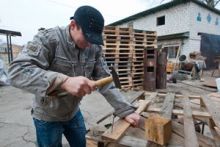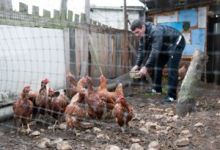The rehabilitation centers (for men and women) for drug addicted persons at the Protestant church “Victory,” in Brovary, Kyiv oblast, are known as Ukraine’s best ones, apparently, based on their results. After all, the life of its pastor is the best proof of this. Serhii DUDKA used to be an especially dangerous criminal, a four-time convict. While he was serving his last term in jail, he was nearly crushed by a truck. Now you can hardly see a sign of that incident.
Serving drug addicted people started with home groups in 1998. The rehabilitation centers were established much later, in the mid-2000s.
The stay of drug addicted persons in these rehab centers is confidential. Understanding how delicate the situation is, we visited only the center for men. This is a private house in a village near Brovary. The rehabilitants (there are six of them at the moment) are maintaining the household on their own. Apparently, they receive some funding. They are running a small farm (hens). Their daytime activities include physical exercises, personal prayer, joint prayer (reading of psalms and parables), making notes from the New Testament, DVD recordings of sermons, work therapy (there are big logs in the yard, which one should saw into firewood), prayers of gratitude and repentance.
Clearly, we got acquainted only with those who were eager to communicate and did not mind us making photos of them from behind. There were few people, willing to do so, in fact, only one, 25-year-old Volodymyr from Donetsk oblast (we changed his name). “I have undergone treatment in many places,” he said shortly, “To no avail. Hopefully, after this place I will break free from addiction. I really hope for that, because I want to live. I dream of continuing my studies. Probably, my wife and my daughter will return to me then. In a word, I want to start a new life. However, I have already started it. Here.”
Two candid interviews with the directors of both rehabilitation centers, Serhii ASTAPENKO and Yevhenia ROMANOVA were like compensation. They are former drug addicts. Now each of them is serving others, using their personal experience and proving that everything is possible with God.
SERHII: “I am 37. I have spent most of my life for sex, drugs, and rock-n-roll. When I compared the life of good people and the bad ones, I liked the lifestyle of the latter more: apartments, cars, get-togethers, girls… I thought, ‘Cool!’ But there was an event, after which I decided to kill myself.”
What kind of event?
“My father committed suicide out of reasons which can hardly be explained. On the whole, we used to be a normal family: dad, mom, and three sons.
“I used to have a huge addiction to drugs. I can even say I was using the entire Periodic table (I found myself in the middle of the heroine fever: in the 1990s Kyiv was heaped with heroine). And when I decided to commit a suicide, it was my fifth clinical death from overdose. I remember, when I opened my eyes, I saw the same doctor, to whom I had gotten all four times before. ‘Only God could give you such a strong heart,’ he said. According to statistics, after the second clinical death people become physically disabled, in particular, they acquire heart diseases, of course if they survive. I kept thinking about it for a while. Then I said, ‘God, if you want me to live, make something about my life, because I am unable to do this on my own.’
“I have created a family. Soon our first baby will be born. I work and serve at the rehabilitation center. I have true friends.”
How did you break free from the drug abuse?
“I came to the rehabilitation center in Korosten, Zhytomyr oblast. Incidentally, it was at the church ‘Victory,’ too.
“I believed in God right away, but I was unable to believe in myself for a long while. I frequently asked the believers, ‘How many years have passed since you started to believe?’ ‘Four, five, seven,’ I heard in reply. ‘Haven’t you felt apathy, haven’t there been any breakdowns during this period?’ I continued to ask. If I heard, ‘no,’ I did not approach those people any more. I did not believe them. Later God gave me people whom I trusted.
“Apparently some inner struggle was taking place. I was looking for changes, but I did not like the way God was doing this: I had to change completely, including my views, relations, and way of life on the whole.”
Now your friends are all new people.
“Not all of them. My old friends have not turned away from me. I did not turn away from them either. Sometimes we meet. They don’t drink alcohol or smoke in my presence. When we say goodbye and shake hands, they say they will come to church soon. (Laughing.) I understand that it is hard for them to find the courage to do that: there are things they don’t understand or accept. When I became a believer, many people thought I had schizophrenia. Now they often phone me and ask for advice. In our service we have such a kind of activity as helping family and friends. So, I am experienced in this kind of communication.”
Besides, you prove this with your life.
“This proof is very important, especially for the addicted persons whom I serve.”
Like Lina Kostenko writes, “Someone has already experienced this before you.”
“You serve most efficiently only by what you have experienced and what left behind. I don’t ask people from the rehab center to do what I never did, neither do I make them go through things I never did myself.
“Recently many rehabilitation centers (both secular and Christian) have spoiled their reputation for use of force. We have had a situation, when a mother brought her son. While talking to me, she was looking around all the time. I asked her, ‘What’s wrong?’ ‘Where are the grids on the windows, a basement to lock up a person for disobedience and handcuffs?’
“For us it is important to have the least human intrusion possible: we all fulfill our duties (I am the director) and simply love each other.”
“Six months at the least. Incidentally, it is very important that the drug addicted person himself wanted to stay at the rehab center, not his parents, wife, or friends. Of course, there is nothing impossible for God. But when a person is locked up, some contradictions emerge, the person starts to complain and disobey. And there can be no efficiency without discipline.
“So, at first there are 10 days of quarantine. Then for two months the person gets accustomed. Those who have been living longer in the rehab center become the mentors for the newcomers. With them the newcomers may leave the territory of the center. I trust the mentors with money and buying food. Two months later I ask: ‘Do you want to love and be loved, to trust and be trusted? Be courageous, to truly correspond the nature of a man?’ Thus we proceed to the period of fostering these traits of character. This number of features was demonstrated to us by Jesus, so we in particular read the Bible a lot, as well as popular science literature on the harm of drugs. At the final stage our rehabilitants take part in all-Ukrainian Christian seminars, attended by many people like them and those who have already become free from drug abuse. Importantly, they start to communicate and this communication lasts even after they all come back to normal life. Incidentally, the main guaranty of normal life is to continue to live with God. After six months of rehabilitation an adaptation, which should last for six months at the least, takes place: we try to keep the person in sight. If the person comes from Brovary or Kyiv, we keep him in our church, entrust him with serving, or simply continue to communicate. If the person is not local, we get in touch with other churches in one place or another, with which we have good relations.”
Do all of your rehabilitants get rid of drug addiction?
“Of course, not. In my two-year period of serving about 60 persons in this rehabilitation center quit their rehabilitation course. Nearly all of them repeated one and the same thing: ‘I am not ready. This is not my cup of tea.’”
Faith, Bible readings, making yourself open for the love of God, influence of Holy Spirit are all spiritual things. What about the physical things? What do you do, for example, when the drug addicted person feels withdrawal pains?
YEVHENIA: “Of course, it may be hard at the beginning of rehabilitation. [Yevhenia is 29, she has been addicted to opium when she was aged between 16 and 24. She’s married to a former drug addict. – Ed.]. I remember physically I felt very bad. But the hope was living inside that God would lead me out of that hell, like He had led many of those who were serving me in one of Kyiv’s rehabilitation centers.
“I had undergone treatment 15 times in various clinics. Besides, I had been consulting psychologists. This did not produce any results. My parents put up with the fact that their beloved daughter was a drug addict. (I am from a good family. I started using drugs to keep the company. I wanted to be cool.)
“Apparently, we cooperate with hospitals. Our rehabilitation centers are operating at the Victory Foundation, which in its turn is operating in the eponymous church. Since the foundation (directed by Nadia Chernukha) is involved in various kinds of social activity, it is cooperating with doctors, such as an infection disease specialist, gynecologist, STD and skin specialist, pediatrist, and nurse. If there is any need, we bring them to the rehabilitation centers.”
Yevhenia, you and Serhii work with co-addicts, like parents, spouses, and children of drug addicted persons. Do you work with them separately?
“The Kyiv church ‘Victory’ has groups for co-addicted parents. We send ours there. I know that there they talk about how important it is to support their child or spouse in undergoing the rehabilitation course till the end, and then help them create Christian associations.”
Is this the way the parents of rehabilitants come to church?
“It is usually so. They start from coming to church to support their relatives. I remember, when God healed me, my mother came to the service because of that joy. She did not know how to pray. She only kept whispering, ‘Thank God! Thank God.’
“There is no more joy for us than seeing God’s work in a person (crying). Sometimes I look at one or another young woman and remember how unhappy, physically and emotionally exhausted, and spiritually empty she came. In a while she straightened her back and shoulders and calmed down in her soul. And we understand that God used us to bring the sense of life back to someone.”









